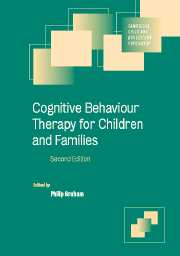Book contents
- Frontmatter
- Contents
- List of contributors
- 1 Introduction
- Part I Developmental cognitive theory and clinical practice
- Part II Engagement and assessment
- 5 Engagement and motivational interviewing
- 6 Cognitive case formulation
- Part III Client groups
- Part IV Applications in psychosocial adversity
- Part V Applications in specific child and adolescent psychiatric disorders
- Part VI CBT applications in preventive interventions
- Index
- References
6 - Cognitive case formulation
Published online by Cambridge University Press: 21 August 2009
- Frontmatter
- Contents
- List of contributors
- 1 Introduction
- Part I Developmental cognitive theory and clinical practice
- Part II Engagement and assessment
- 5 Engagement and motivational interviewing
- 6 Cognitive case formulation
- Part III Client groups
- Part IV Applications in psychosocial adversity
- Part V Applications in specific child and adolescent psychiatric disorders
- Part VI CBT applications in preventive interventions
- Index
- References
Summary
The field of cognitive behaviour therapy (CBT) for children and adolescents is rapidly evolving and is at an interesting stage of development. The majority of random controlled trials (RCTs) on CBT for a range of disorders have been behaviourally orientated rather than focusing on cognition. The more cognitive approaches to CBT have yet to be evaluated and are at the case study stage. In line with the developmental stage of the field, cognitive case formulation is not an area that has attracted much interest in child and adolescent CBT, and there is little literature on it. However, cognitive case formulation is currently the subject of an interesting debate in the adult CBT literature and this will be summarized here.
This chapter will describe the nature of cognitive case formulations, and the issues to be considered when carrying out cognitive case formulations with children and adolescents. It will discuss using newer approaches to cognition in CBT for children and adolescents and the role of the family in cognitive case formulations. The need for research in a range of areas will be outlined, including its role in the development of cognitive models for children and adolescents. Finally, a case example will be given which illustrates the use of a cognitive case formulation. The treatment based on this cognitive case formulation will then be contrasted with a more behaviourally orientated CBT case study.
- Type
- Chapter
- Information
- Cognitive Behaviour Therapy for Children and Families , pp. 84 - 100Publisher: Cambridge University PressPrint publication year: 2004
References
- 1
- Cited by

